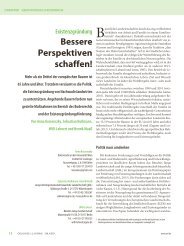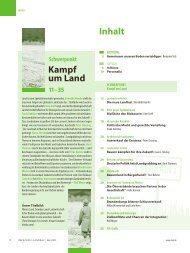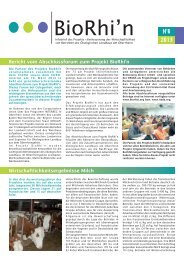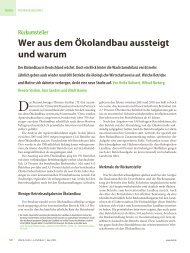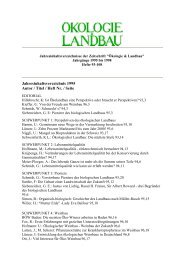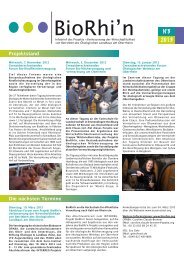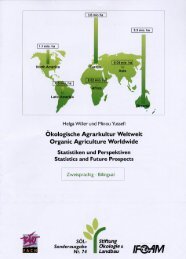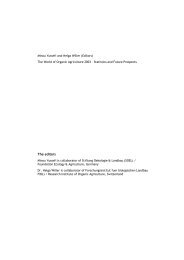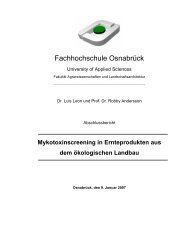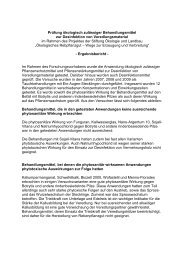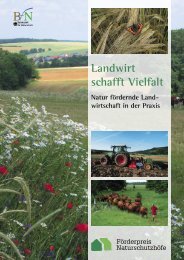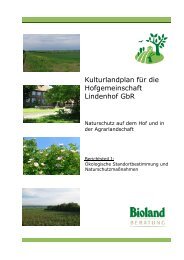the world of organic agriculture - Organic Eprints
the world of organic agriculture - Organic Eprints
the world of organic agriculture - Organic Eprints
Create successful ePaper yourself
Turn your PDF publications into a flip-book with our unique Google optimized e-Paper software.
5 <strong>Organic</strong> Farming Worldwide 2006<br />
Asia<br />
In Asia, <strong>the</strong> area under <strong>organic</strong> management has been comparatively small in <strong>the</strong> past years, but<br />
in China <strong>the</strong>re has been a large increase <strong>of</strong> nearly three million hectares in <strong>the</strong> year 2004, which<br />
is dedicated to pastoral land that has not been certified before. The total <strong>organic</strong> area in Asia is<br />
now about 4.1 million hectares, managed by almost 130’000 farms. Additionally, 6.4 million<br />
hectares are certified as forest and ‘wild harvested’ areas. Among <strong>the</strong> more significant countries<br />
producing <strong>organic</strong> products are China, India and Russia. For many countries <strong>the</strong>re are still no<br />
precise figures available, but a number <strong>of</strong> countries where activities were not recorded previously<br />
reported data this time.<br />
There are 117 certification bodies operating in Asia from which 104 are placed in China, India<br />
and Japan. However, most <strong>of</strong> <strong>the</strong> exporters continue to be certified by foreign certification bodies<br />
operating in <strong>the</strong> region. The majority <strong>of</strong> activities and development in <strong>the</strong> region is happening<br />
without market regulation and certification. <strong>Organic</strong> rules are already in place in a number <strong>of</strong><br />
Asian countries including India, Japan, Korea, Philippines, Taiwan and Thailand. <strong>Organic</strong> rules<br />
tend to be mandatory in importing countries and voluntary in exporting countries. Only Israel<br />
has attained equivalency status with <strong>the</strong> regulation <strong>of</strong> <strong>the</strong> EU.<br />
The highest reported domestic market growth, estimated to be up to 30 percent, is in China<br />
and an <strong>organic</strong> boom seems to be taking place in Indonesia. The range <strong>of</strong> marketing channels<br />
is diverse, as are market conditions from rural India to Tokyo, including ad hoc <strong>organic</strong> bazaars,<br />
small retail shops, supermarkets, multi-level direct selling schemes and internet marketing.<br />
Exports are still largely composed <strong>of</strong> fresh produce and low-value commodity crops. Recently,<br />
aquaculture, particularly shrimp farming, is becoming popular, with projects in China, Indonesia,<br />
Thailand and Vietnam.<br />
Africa<br />
In Africa, <strong>organic</strong> production is rarely certified, and for many countries new figures were not<br />
available. Never<strong>the</strong>less, <strong>organic</strong> farming is increasing in Africa, especially in <strong>the</strong> sou<strong>the</strong>rn<br />
countries. An important growth factor in Africa is <strong>the</strong> demand for <strong>organic</strong> products in <strong>the</strong><br />
industrialized countries. Ano<strong>the</strong>r motivation is <strong>the</strong> maintenance and building <strong>of</strong> soil fertility on<br />
land threatened by degradation and erosion. More than 1 million hectares are now managed and<br />
certified <strong>organic</strong>. Additionally, 6.8 million hectares are certified as forest and ‘wild harvested’<br />
areas. With a few exceptions (notably Egypt and South Africa) <strong>the</strong> African market for <strong>organic</strong><br />
produce is very small. This is due both to low-income levels and an undeveloped infrastructure<br />
for inspection and certification. Most certified <strong>organic</strong> production in Africa is geared towards<br />
export markets, with <strong>the</strong> large majority being exported to <strong>the</strong> EU, which is Africa’s largest market<br />
for agricultural produce. At present Tunisia is <strong>the</strong> only African country with its own <strong>organic</strong> (EU<br />
compatible) standards, certification and inspection system. Egypt and South Africa have both<br />
made significant progress in this direction; both have two certifying organizations and are well<br />
on <strong>the</strong> way to developing standards.<br />
27



